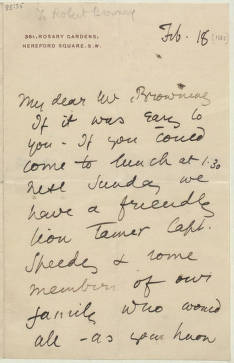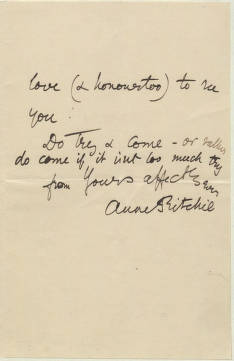One of the letters between Lady Ritchie and Robert Browning describes what promised to be an interesting lunch involving wild animals.
Letter from Anne Thackeray Ritchie to Robert Browning. 18 February [1885]
Anne Thackeray Ritchie makes this request to Robert Browning. “If you could come to lunch at 1:30 next Sunday we have a friendly lion tamer Capt. Speedy & some members of our family who would all—as you know—love (& honour too) to see you.”
Another envelope bearing Anne Thackeray Ritchie’s handwriting held an interesting drawing by Robert Browning.
 A pencil sketch of Archbishop Stigant with crosier, signed “Roberti Browningii opus” is accompanied by an envelope annotated by Anne Thackeray Ritchie: “Bishop Stigand.” The image was drawn following a visit to see the Bayeux Tapestries with the Milsand family in September 1870 according to a letter from Laure Milsand to Anne Thackeray Ritchie, 14 March 1891.
A pencil sketch of Archbishop Stigant with crosier, signed “Roberti Browningii opus” is accompanied by an envelope annotated by Anne Thackeray Ritchie: “Bishop Stigand.” The image was drawn following a visit to see the Bayeux Tapestries with the Milsand family in September 1870 according to a letter from Laure Milsand to Anne Thackeray Ritchie, 14 March 1891.
Yet another inscription by Robert Browning thanks Miss Thackeray for a gift.
The Inn Album by Robert Browning (London, 1875)
Still another inscription by Robert Browning notes that this book of translations was given to him by Miss Thackeray and Hallam Tennyson, Alfred Lord Tennyson’s son.
Richard Claverhouse Jebb, Translations into Greek and Latin Verse (Cambridge, 1873).
The half-title page of this book bears this inscription by Robert Browning:
(The joint gift of Annie Thackeray and Hallam Tennyson:
x)
x) καὶ μὴν Μάρων μοι πῶμ᾽ ἔδωκε, παῖς θεοῦ,
ὃν ἐξέθρεψα ταῖσδ᾽ ἐγώ ποτ᾽ ἀγκάλαις.R B, Dec. 19. ’73: ὡς σαφέστερον μάθης.)
The lines are from Euripides, Cyclops, lines 141-42, p. 153 in Euripides Witzschel, Vol. 2 in Browning’s traveling Greek library. (Look for another blogpost soon about this unique collection item.) The lines refer to an exchange between Odysseus and Silenus. Oddysseus says: “What is more, Maron, the god’s own son, gave me the drink.” And Silenus replies: “The lad I once raised in these very arms?” It is followed by Robert’s comment in Greek: “to make my meaning clear, ” probably referring to the “x” he placed under Hallam Tennyson’s name and alluding to his close connection to Hallam. If Hallam is “the god’s own son,” does it also intimate that Tennyson is the god?





